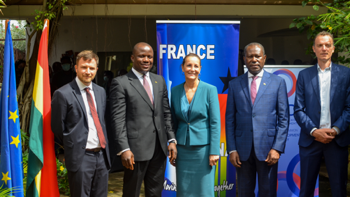The French Embassy in Ghana, in collaboration with non-governmental organisation ‘Noe’, has launched phase-II of the EconoBio project – an initiative that seeks to develop green value chains for the benefit of local populations living on the outskirts of biodiversity-rich areas.
The four-year project, which is worth €1.8million, is a large-scale programme aimed at developing income generating activities to the benefit of communities living on the outskirts of four selected sites: Mole National Park, the Western Wildlife Corridor, Ankasa-Tano Forest and Atewa Forest.
EconoBio II is targetted at the restoration and sustainable management of over 300,000 hectares of forest lands with 150,000 local trees planted and reduced illegal logging as well as poaching.
The programme also aims at supporting the establishment and strengthening of local governance structures to ensure sustainable and community-based management of natural resources and commercialisation support for social enterprise.
French Ambassador to Ghana, Anne Sophie Ave’, indicated that expected outcomes from the project include five value chains strengthened with at least five business plans developed and implemented; 5,500 producers/farmers with 50 percent being women empowered; about €200,000 invested in equipment and construction of processing facilities; and over 40,000 people with increased awareness through environmental education and awareness campaigns, among other outcomes.
Minister for Lands and Natural Resources, Samuel Abu Jinapor, in his remarks at the launch reiterated that the contribution of forests and wildlife resources to the protection of our environment, and particularly to the fight against climate change, cannot be overstated. Yet, human activities over the years – such as, illegal logging, bushfires, excessive fuel-wood harvesting, bad agricultural practices and illegal mining – continue to pose serious threats to these natural resources.
“In Ghana, we have lost some eight million hectares of our forest cover from 1900 to date, with almost one million hectares being lost in the last few years. This cannot continue. We must take urgent and bold steps to reverse this trend if we are to enjoy the numerous benefits biodiversity presents us.
“The project we launch today is another important intervention to protect our forests and biodiversity, while at the same time improving the lives and livelihoods of our people. It combines community development, small industrialisation and biodiversity conservation to increase income and preserve natural resources. This clearly aligns with our Forest and Landscape Restoration Master Plan and the Forest and Wildlife Policy,” he said.
The minister further indicated that government’s commitment to safeguard the environment and protect the natural ecosystem is unflinching and total, which is crucial to reversing the negative impacts of climate change on the people and improve their living conditions.
Four local NGOs have been selected as partners for the Director of International Operations of Noe, Nicolas Drunet, to implement the project: and these included A Rocha Ghana, West Africa Primate Conservation Action (WAPCA), Northcode, and Organisation for Indigenous Initiatives and Sustainability (ORGIIS). The funding partners include the French Development Agency (AFD), Critical Ecosystem Partnership Fund, and Sofi Tucker Foundation.










